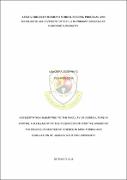Africa Children Mission’s School Feeding Program, and scholastic achievement of pupils in primary school Kakooge Sub County
Abstract
Africa Children‘s Mission has been running a School Feeding program in Kakooge sub county Nakasongola district for over 10 years yet results from the last 2 PLE revealed a growing decline among the schools where the program is being run. This prompted the researcher to conduct the study generally to establish the relationship between ACM‘s school feeding program and scholastic achievement of primary school pupils in the sub county. The specific objectives included; to establish the effect of provision of food on pupils scholastic achievements, to identify the role played by monitoring of ACM‘s SFP on pupils‘ scholastic achievement, to find out the moderating effect of parents‘ participation in school activities on the relationship between provision of food and scholastic achievement of pupils in primary schools of Kakooge Sub county Nakasongola district. The researcher employed both qualitative and quantitative methods; quantitative methods- to capture some statistics from pupils, and qualitative approach to provide perspectives and explanations of the program from the major stakeholders. In addition, the study was majorly exploratory for purposes of providing an accurate picture of what is happening with the SFP and scholastic situation of pupils in the sub county. Questionnaires were administered to 235 pupils in the four main schools under the program, and interviews, as well as focus group discussion were conducted among purposively selected stakeholders i.e. teachers, head teachers, parents and one sub county education coordinator. The study found out that the major contribution of SFP among pupils in the sub county was that it encouraged pupils to regularly go to school, attend class throughout the day, improve their concentration in class, as well as improve school enrollments in the area. While monitoring of the program existed, its objectives were not clearly linked to scholastic achievement. Parents support to both the SFP and to their children‘s‘ education was found to be insufficient and thus not adequately helping pupils scholastic achievement as well as the sustainability of the feeding program.
The major conclusion of the study is that ACM‘s SFP encourages pupils to regularly go to school, attend class throughout the day, improve their concentration in class, as well as improve school enrollments in the area. The study therefore recommends improvement in parents‘ involvement in their children‘s education, especially in academic activities, and cooperation between them and teachers, enable schools record desirable scholastic achievement of pupils.


